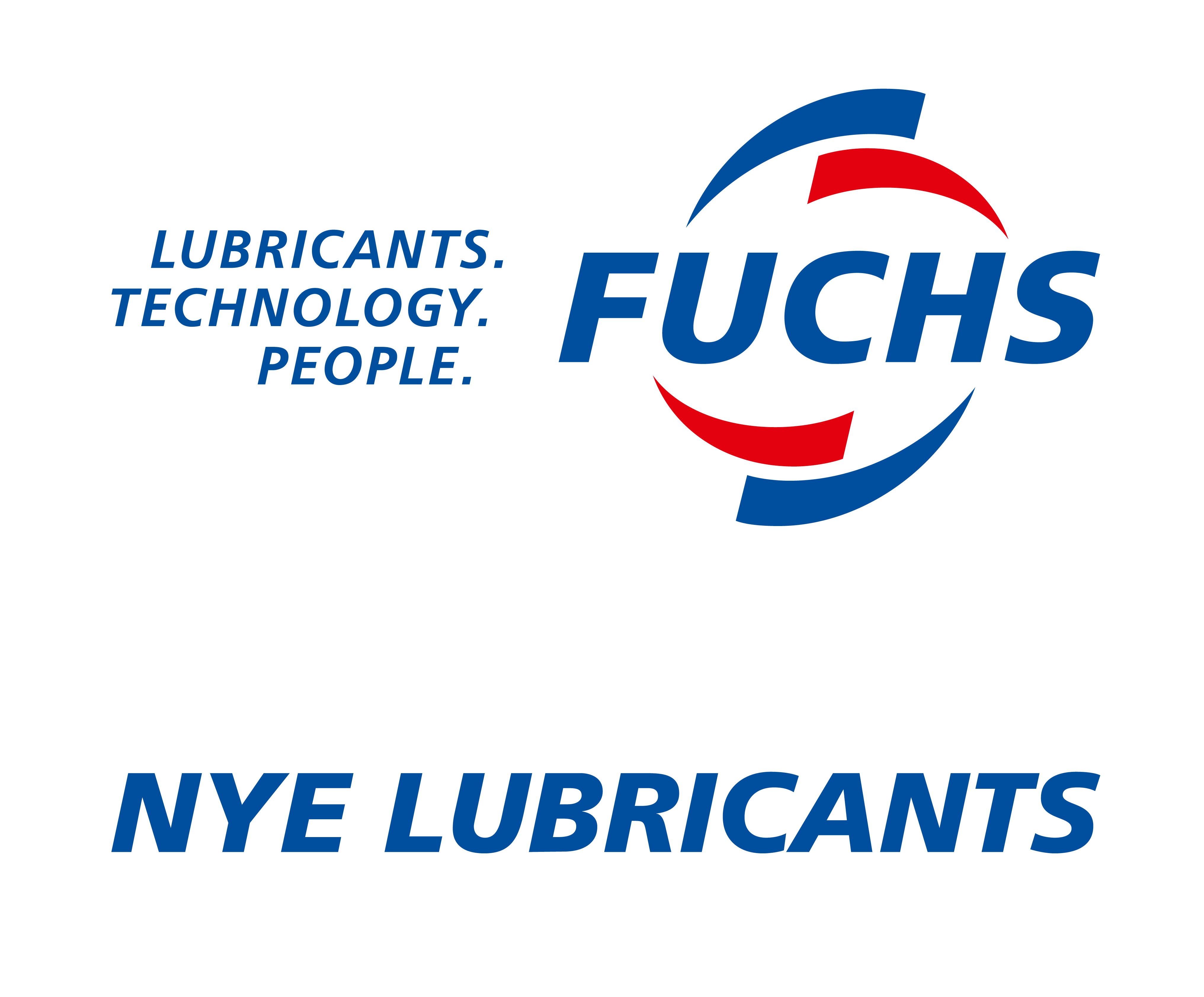Test Before You Drive
When selecting an automotive lubricant, many factors need to be considered such as material compatibility, operating conditions, and environmental conditions. The best way to ensure a lubricant is suitable for your application is through validation testing.
For many customers, actual application testing is often unfeasible, as planning and executing simulated application tests in-house are time consuming, costly and require experienced personnel and labs that may not be readily available.
Nye’s Applications Development and Validation Testing (ADVT) Laboratory houses state-of-the-art test equipment that can simulate the dynamic operating conditions of your application. This testing helps predict performance, wear, and lifetime so that we supply you with the lubrication solution that best meets your requirements while saving you the time and effort of validating the lubricants at your facility.
Friction and Wear
Nye’s ADVT Lab houses a variety of equipment to test the friction and wear properties of our lubricants.
The SRV (Oscillating, Friction & Wear) test rig runs custom tests with options that include: rotational and linear oscillatory motion, tests up to 2,000 N load, 2,000 RPM, and a maximum temperature of 180°C. Specimens include ball on disc, pin on disc, cylinder on disc, and custom geometries.
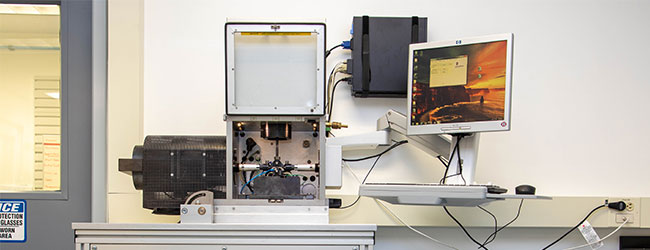
The Mini Traction Machine measures friction in a mixture of rolling/sliding contacts to simulate applications, like rolling element bearings and gears. Unlike other tribological tests where speed is either measured as the amount of rotations during a period of time or the oscillatory frequency, the MTM allows for the speed element to be a combination of sliding and rolling speed to produce the entrainment speed.
The MTM provides a very good testing method for scuffing and galling of metal surfaces by allowing for the ball and disc to be driven in different directions (contrarotation). This produces a tribological test that can operate with high sliding/rolling speeds and low entrainment speed.
Endurance and Durability
It is important to validate your lubricant for endurance and durability to ensure that they will withstand the life requirements of your application under specific operating conditions.
Lubricant life is critical to rolling element bearings. The R0F+ Bearing Tester tests the functionality and life of lubricating greases in rolling bearing applications at various conditions. Using this test, we estimate the grease life, temperature limits, and speed factor (dmN) for our products that are to be used in bearing applications.
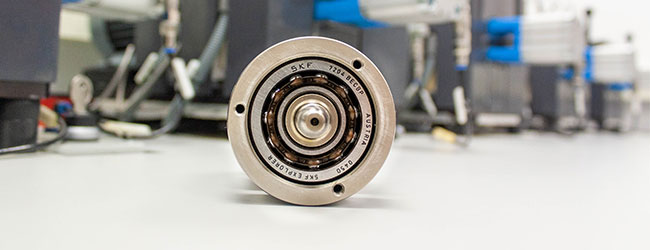
The ROF+ tests lubricating greases at speeds up to 25,000 RPM (900,000 dmN), temperatures up to 230°C, radial loads of 50-900 N, and axial loads of 100-1,100 N. The standard bearings are 6204 deep groove ball bearings or 7204 angular contact ball bearings, but other geometries including customer supplied can be utilized.
Instron Force Testing
Our Instron Tensile Test Rig can affix a wide variety of customer components to test the efficacy of a lubricant in a multitude of linear applications. Applications can range from headrest actuation and feel, to steering column collapsible spline shaft testing.
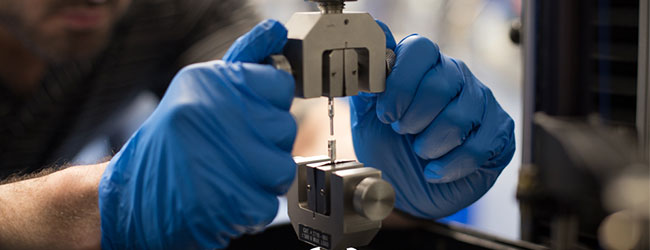
Plotting the required force to move a component throughout its range of motion provides valuable data that can then be relayed back to the customer for approval, or further design considerations. Interchangeable load cells allow the Instron to test components as small as a single electrical connector’s insertion force, to components as large as steering columns with splined shafts designed to collapse in the event of a head on collision.
Fretting wear is the result of micromotion caused by vibration or thermal cycles. Wear and oxidation lead to increased friction, heat, degradation, and contact resistance, which leads to the failure of tribo-contacts.
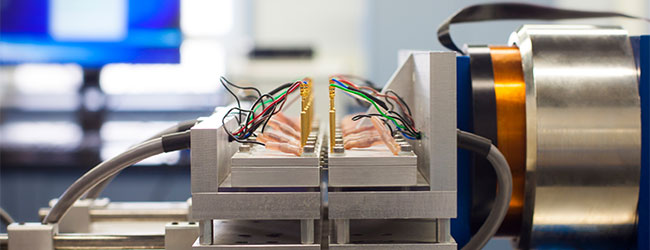
Nye’s modular fretting test rig, or multi-terminal fretter, allows us to test a variety of components and geometries to ensure our lubricant will outlast your component life requirements. Standard geometries include: cylinder on cylinder, ball on disc, and electrical terminals. We can accept a wide variety of geometries and supplied components.
This methodology validates the performance of a lubricant in a real-world fretting environment. Durability and life probabilities are then determined to better understand the performance and life improvements made to the system. Life test specifications are determined by the customer.
Custom Testing
Nye’s Application Engineers will work with you to design and build custom test equipment that meets your application requirements and validates our lubricant for your application.
Our custom test rig for Electric Power Steering simulates road conditions and life endurance tests on customer supplied EPS units while measuring frictional torque, heat generation, wear, and more. Our EPS Test Rig is composed of three separate rigs that accurately simulate EPS operations: A Magnetic Brake System, On-Road Conditions, and a Parking Check.
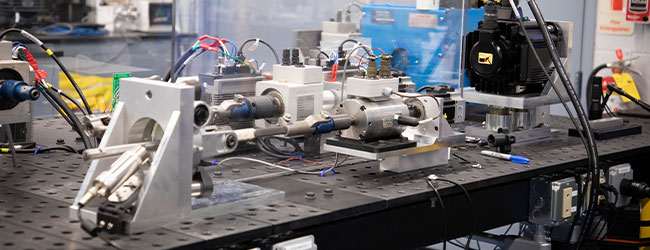
Nye engineers are currently using the data collected by our test rigs to formulate next-generation greases for the Automotive Industry. Click here to contact us if you would like to learn more about how our rigs can help qualify a lubricant for your design.
